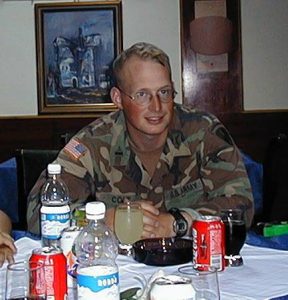On Writing

Kosovo
I get asked a lot of questions about how one gets to be a writer. What should someone do if they want to be a writer. I’d like to say that there is a simple answer, do X or Y enough and you too can be a writer. I don’t have a pat answer other than, perhaps, write. Every novel begins with one word.
The best I can do is tell you a little bit about how I got here. The first thing is to read and read voraciously. I was a slow reader in elementary school, reading well below my grade level. Then in Mrs. Oliver’s fourth grade class there was a program designed to encourage reading. Read a small book, get so many points, enough points and you’d get something like an eraser or fancy pencil. What can I say the early 1980’s were a time of austerity in children’s toys. Whatever it worked, by the next year I was reading my then stepfather’s discarded Stephen King and Clive Cussler novels. Part of me still wants a Doxa dive watch a la Dirk Pitt.
When I moved to Providence, Rhode Island to live with my father he had bookshelves crammed with books. A lot of it was not to my liking but there were classics like The Treasure of the Sierra Madre. There were always mystery novels floating around and I was introduced to Raymond Chandler, Dashiell Hammet and Georges Simenon. I would spend hours reading and when I had burned through what was interesting and available there were trips to the bookstores. The now defunct College Hill Books on Thayer Street was preferred. There were used bookstores that offered great value for the money. No trip to Boston was complete without a stop at the Brattle Book Store, which I try to work into every Andy Roark novel.
When my book habit got to be too expensive, my father got us a membership to the fantastic and wonderous Providence Atheneum. The Atheneum is a fantastic place, a small Greek Revival building made of granite that once inside you could transported back two centuries in time. I never left with less than three books checked out. Even better was the shelf of paperbacks that cost a dollar each. There were some gems in there that I am sorry I let slip away over the years.
The other thing that helped me hone my craft was writing letters. I shipped to what was then Fort Benning (now Fort Moore), Georgia for One Station Unit Training. OSUT was Basic and AIT combined for recruits foolish enough to want to be in the infantry. I did and I was. In the less enlightened era of 1992, there were no smart phones and the Drill Sergeants would never have let us look at them. Books other than the bible and the Army Smart book, weren’t allowed. If we didn’t fuck up, we were allowed to call home one night a week. The only real entertainment was mail. I quickly learned that the best way to get letters was to write them. My friends, family and a girl or two from URI who I had a crush on were all recipients of my spidery scrawl and bad spelling.
Later on, deployments in 2000, 2003 and 2008, even with the availability of email I still wrote letters. Mail call is a lot like Christmas and there is nothing like being in some strange, unpleasant, foreign country where the locals would like you dead, and getting a letter from your sweetheart back home. Or taking ten or fifteen minutes to jot down your experiences and observations for my father to read. Or writing to someone special about all the ways and things you miss them.
Writing letters taught me a lot and has informed the way I write now. The need to find the right word or turn of phrase matters. Having to use an economy of words because writing by hand is tiring and time consuming. You have to get it right and do it briefly. Writing a letter by hand, there is no spell check, no grammar check, no editors to clean up my mistakes. If you think that’s pressure, try writing a love letter to someone you are desperately trying to impress. It requires a hell of a lot more art than texting eggplant emojis.
It might seem quaint and old-fashioned to talk about writing letters or reading books now. But writing is labor, there are no shortcuts, no easy way. You have to put the words on the page one by one. Each sentence is built on the one before each paragraph leading to the next, until eventually you have pages, chapters and books. You might have found another way to writing your novel, but I haven’t.